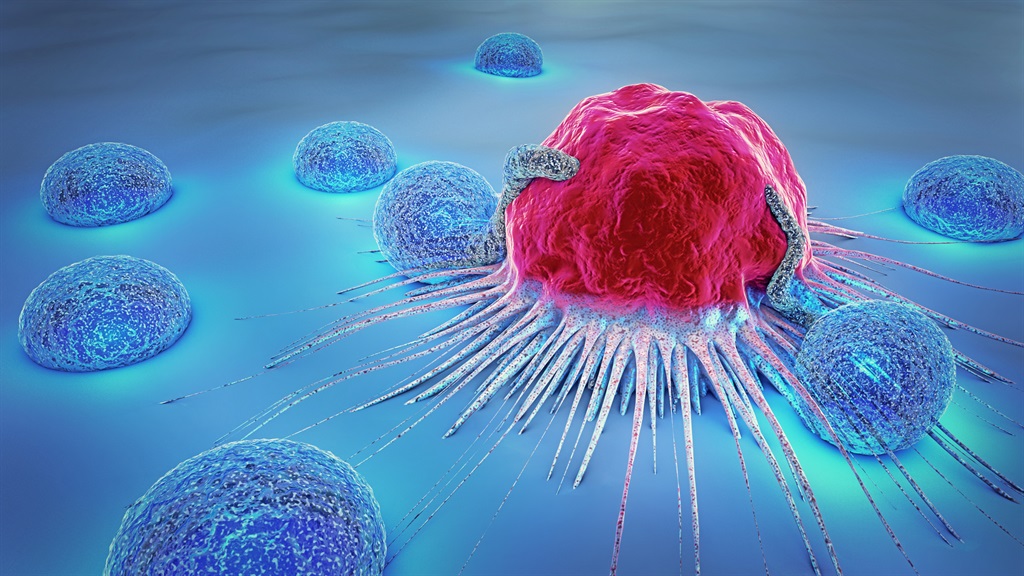
Cancer is a disease of the cells in the body.
Cells are the building blocks of our body and they naturally grow, multiply and die regularly.
Cancer results when cells become abnormal and multiply out of control.
This occurs because one or more genes in a cell becomes damaged or altered. Genes are codes/blueprints/recipe of the cell.
These damaged cells do not know when to stop multiplying and form a mutant group.
If this cell group gets bigger, it becomes a large clump of abnormal cells called a tumour.
A tumour can be benign (nondestructive) or malignant (destructive) cancer.
Cancer occurs anywhere and in anyone. Some cancers are more serious than others, some are more easily treated and curable than others (especially if diagnosed at an early stage).
Some have a better outlook (prognosis) than others.
So, cancer is not just one condition. In each case it is important to know exactly what type of cancer has developed, how large it is, whether it has spread, and how well it usually responds to treatment.
What causes cancer?
Many cancers seem to develop for no apparent reason. However, certain risk factors are known to increase the chance that one or more of your cells will become abnormal and lead to cancer.
Most cancers are caused by a combination of factors as not everyone who is exposed to these factors develops cancer. Here are some risk factors:
Tobacco smoke: Smoking is thought to cause about a quarter of all cancers combined. About one in 10 smokers die from lung cancer.
Age: Aging increases the risk of cancer. This is probably due to an accumulation of damage to cells in the body over time. The bodies repair and defence system weakens over time.
Lifestyle factors: Diet and other lifestyle factors can play a role. Antioxidants found in fruits and vegetables protect against damaging cancer causing chemicals that get into the body.
Eating too much fatty food possibly increases the risk of developing certain cancers. The risk of developing certain cancers is increased by obesity, lack of regular exercise, lots of alcohol and risky sexual behaviour
Infection: Some viruses are linked to certain cancers. Certain high risk strains of HPV (Human Papilloma Virus) are found in majority of cervical cancers and anal cancers. People with Hepatic B or Hepatitis C virus have an increased risk of liver cancer.
Immune system: People with a poor immune system have an increased risk of developing certain cancers, for example people on immunosuppressive therapy or who have HIV and Aids.
Your genetic makeup: Some cancers have a strong genetic link. A cancerous gene can be inherited from your family.
How is cancer diagnosed?
It depends on the type of cancer suspected based on your complaints and examination. This includes tests like X-rays, CT scans, blood tests and biopsies.
A biopsy is a tissue sample that’s removed from the suspected cancerous site and examined under a microscope.
From these tests the site and stage (how far its spread) of cancer is determined and the specific treatment plan is made.
What are the treatment options for cancer?
Treatment options vary and are dependent on type of cancer and its stage. The most common treatments are:
Surgery. The tumour is cut out.
Chemotherapy. This is a treatment that uses anti-cancer medicines to kill cancer cells, or to stop them from multiplying. There are various different types of medicines used for chemotherapy. The medicine or combination of medicines selected depends on the type of cancer being treated.
Radiotherapy. This is a treatment that uses high-energy beams of radiation which are focused on cancerous tissue. This kills cancer cells, or stops cancer cells from multiplying.
Stem cell transplant. High-dose chemotherapy may damage bone marrow cells and lead to blood problems. However, if you receive healthy bone marrow after the chemotherapy then this helps to overcome this problem.
Hormone therapy. This is the use of medicines to block the effects of hormones. This treatment may be used for cancers that are hormone-sensitive such as some cancers of the breast, prostate and womb (uterus).
Immunotherapy. Some treatments can boost the immune system to help to fight cancer. More specific immunotherapy involves injections of antibodies which aim to attack and destroy certain types of cancer cells. Research is underway to try to find vaccines that would stimulate your own immune system to make antibodies against cancer cells.
Gene therapy. This is a new area of possible treatments. Research is under way to find ways of blocking, repairing or replacing abnormal genes in cancer cells.
Special techniques. These can sometimes be used to cut off the blood supply to tumours. The tumour then dies.
For some cancers, a combination of two or more treatments may be used. A range of other treatments may also be used to ease cancer-related symptoms such as pain.
What are the aims of treatment?
The aims of treatment can vary, depending on the cancer type, size and spread. For example, treatment aims to cure the cancer in many cases.
With modern medicines and therapies, many cancers can be cured, particularly if they are treated in the early stages of the disease.
Cancer specialists tend to use the word remission rather than the word cured. Remission means there is no evidence of cancer following treatment.
If you are in remission, you may be cured. However, in some cases a cancer returns months or years later. This is why doctors are sometimes reluctant to use the word cured.
Treatment may aim to control the cancer. If a cure is not realistic, with treatment it is often possible to limit the growth or spread of the cancer so that it progresses less rapidly. This may keep you free of symptoms for some time.
Treatment may aim to ease symptoms in some cases.
Even if a cure is not possible, a course of radiotherapy, an operation, or other techniques may be used to reduce the size of a cancer, which may ease symptoms such as pain.
If a cancer is advanced then you may require treatments such as nutritional supplements, painkillers, or other techniques to help keep you free of pain or other symptoms.
What is the outlook for people with cancer?
• Some cancers are easy to treat and remission is easy to achieve.
• Some cancers are more aggressive and grow more quickly than others.
• Some cancers respond to treatment better than others.
• Some cancers are more likely to spread to other parts of the body.
• Cancer technology and medicine is evolving rapidly with cutting edge treatments therefor the outlook of many cancers has changed from the past.
Therefore, it is not possible give an overall outlook (prognosis) as each cancer has its own biological behaviour and treatment choices.
As a general rule, the outlook is usually better the earlier a cancer is detected and treated.
• Dr Ngidi is a clinical and radiation oncologist (cancer specialist) in private practice in Johannesburg. She’s also an honorary lecturer at the University of KwaZuluNatal. For more information please visit www.cancerdoctor.co.za
#IAmAndIWill – You have the power to reduce the impact of cancer for yourself, the people you love and for the world. February 4 is World Cancer Day, and 2019 marks the launch of the three-year I Am and I Will campaign. I Am and I Will is an empowering call-to-action urging for personal commitment and represents the power of individual action taken now to impact the future.




 Publications
Publications
 Partners
Partners








